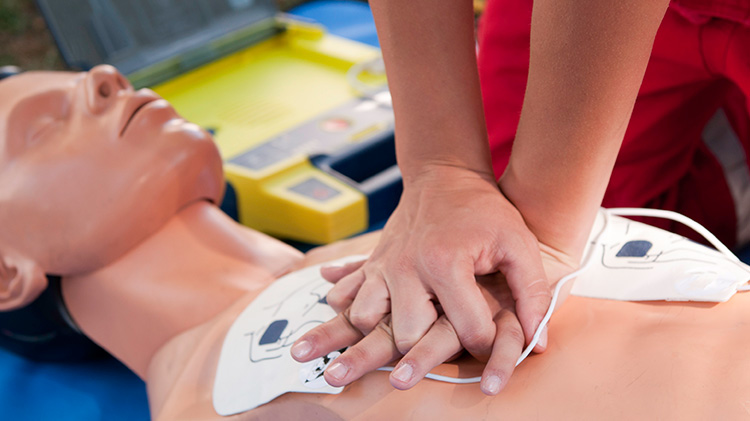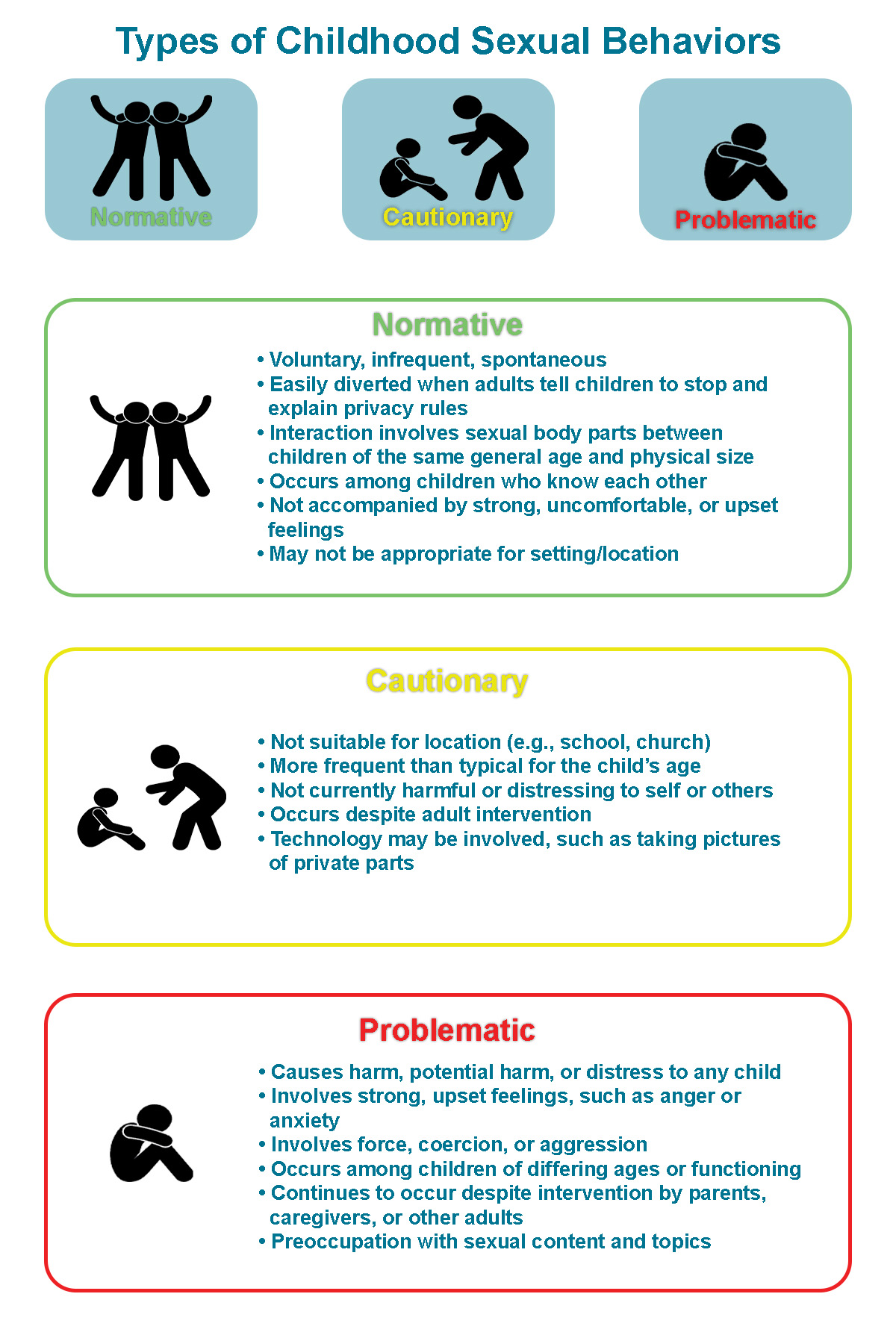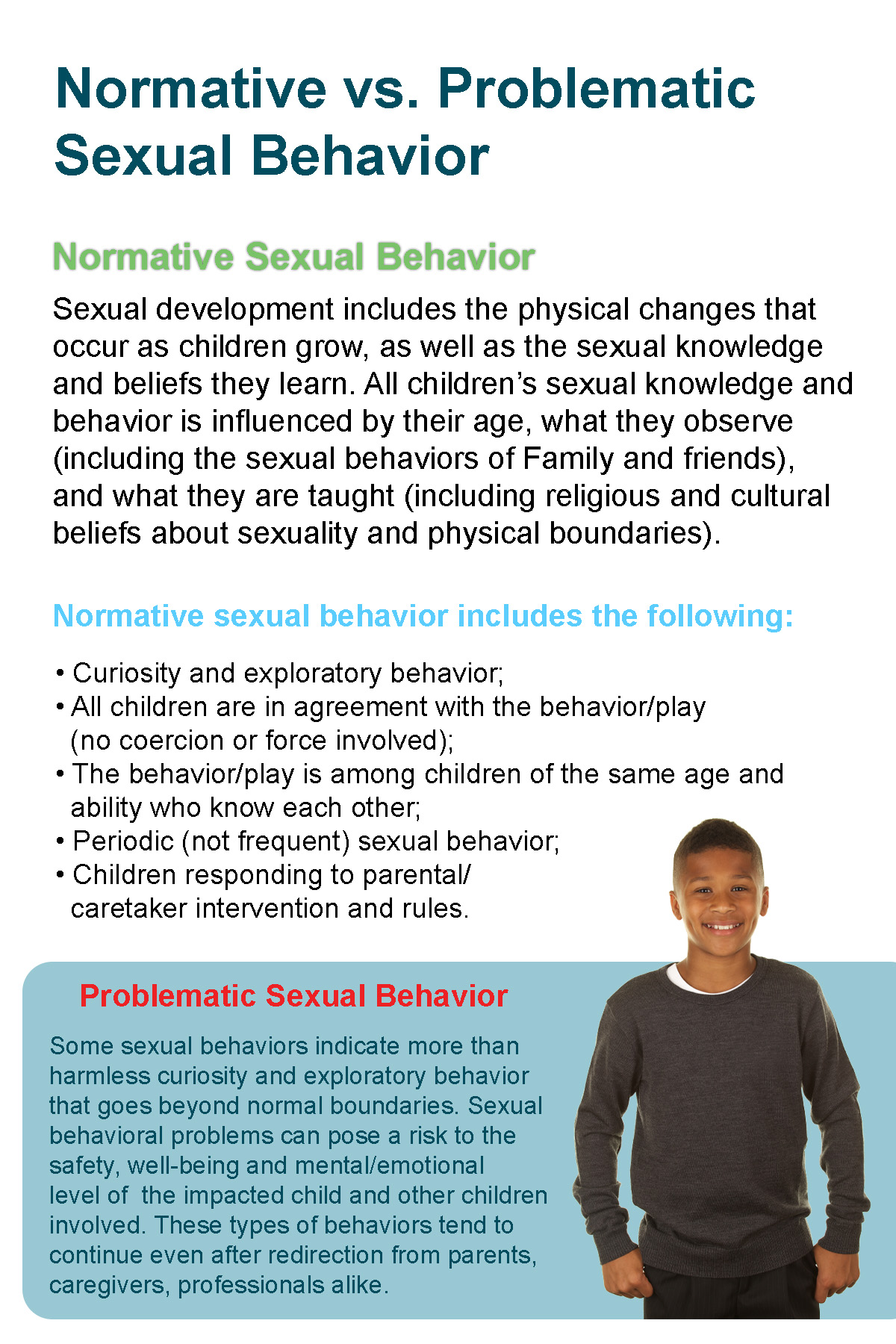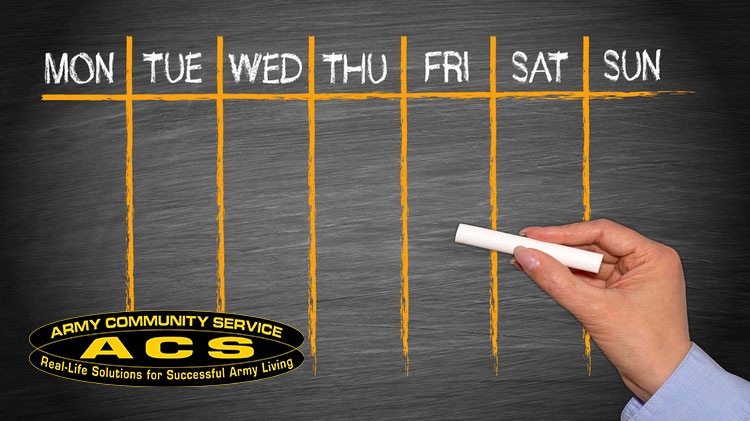- Types of Childhood Sexual Behaviors
- Normative vs. Problematic Sexual Behavior
- Causes of PSB-CY
-
There are several pathways and a multitude of causes that can bring about problematic sexual behavior in children and youth (PSB-CY). Several factors include:
- The child’s inability to respect the physical and personal boundaries of others.
- Defiant behavior and difficulty following rules.
- Social problems including difficulty making friends their own age.
- Poor decision-making skills
- Excessive exposure to adult nudity or sexual acidity in the home or viewed in media.
- Struggles with learning.
- Anxiety and the inability to self soothe.
- Children & Technology/Media
-
Children and youth often gain most of their sexual knowledge and education through media outlets and peers. Not only does this information often wrong it can potentially and usually pose a false pretense. This causes a foundation that needs to be mended upon the correct sexual values that parents/caregivers initially want to convey.
Controlling/limiting the expose to media exposure can provide appropriate boundaries and alternatives to properly teach children the importance of sexual issues. Getting to know the ends and outs of video game ratings, movies, social media content, television shows and have those parental controls and guidelines in place for the safety, supervision, and appropriateness of healthy choice decision-making regarding sexual health, development, and knowledge.
- Advocating & Reporting
-
With military Families on military installations, the Family Advocacy Program (FAP), is responsible for supporting families whose children who have been exhibited or been impacted and/or involved by problematic sexual behavior (PSB). That informed support they provide endless resources, supportive counseling, and specialized resources.
Teachers & professionals
DOEA SCHOOLS, CYS/CDC’s
If a PSB occurs at one of these locations a Department of Defense Education Activity (DODEA), Child and Youth Services (CYS) or at Child Development Center(CDC) a trained staff member will:
- Contact the parents/caregivers immediately.
- Provide a safety plan and supervision plan for all children (exhibiting, impacted and/or involved) with PSB.
- Gather additional information resource and report to Family Advocacy Program (FAP).
- Review all cases until Family Advocacy Program (FAP)- related services are completed/discontinued and all other related community risk factors have been addressed.
- Continued Support for Military Families
-
Child-Focused Advocacy
The Family Advocacy Program (FAP) is a Department of Defense Program (DOD) designated to fully address domestic abuse, child abuse and neglect, and problematic sexual behavior in children and youth (PSB-CY). The overall goal of child-focused advocacy is to truly empower parents and legal guardians with the tools to take action. This multitude of active and informed role helps to establish a secure and more stable foundation for safety, stability for their children and Family to participate in recommended and appropriate services.
FAP personnel will provide that guidance to support child-focused advocacy for parents, caregivers/guardians:
- Explain services through FAP.
- Describe PSB-CY multidisciplinary team (MDT) approach to coordinate a response to referrals of PSB-CY.
- Facilitate access to a various range of military-and-community based specialized resources.
- You Are Not Alone
-
As a parent, caregiver/guardian you may feel isolated after the discovery of your child showing signs of problematic sexual behavior (PSB). It’s important to understand that you are not alone. Other parents have experienced the same reactions and emotions. Rest assured that with the right systems and supports in place, you your child and family can move from under the feelings of distress to a true sense of hope and positive outlook on the future.
- Frequently Asked Questions
-
Is it ok to have strong thoughts and emotions if I have a child with PSB-CY?
Yes. When parent’s first discover their child is exhibiting PSB, they may have numerous reactions. There are no defined or clear stages to go through with this latest information but, no initial response is right or wrong. Some common reactions include:
- Disappointment, sadness, or shame
- Guilt or remorse
- Anger or blames at themselves as parents/caregivers.
- Feelings of isolation
- Confusion or uncertainty
What is problematic sexual behavior in children and youth?
PSB-CY is behavior initiated by children and youth younger than 18 that involves using sexual body parts in a manner that is:
Beyond their stage of development or atypical of behavior for kids their age.
Potentially harmful to the child initiating the behavior as well as any children impacted by the behavior.
Should I teach my child about sexual issues?
Yes. Sexual information learned from television, music, social media content, friends can be so wrong, not-age appropriate and harmful. It is particularly important to discuss with your children in an age-appropriate way.
How can parents learn more about child sexual development?
They can be connected to resources and information about healthy child sexual behaviors, including tips for parents to promote healthy child sexual development. Learn more through the additional resources and Family Advocacy Program.
How does the Family Advocacy Program respond to PSB-CY and what kind of help is available?
When a child or youth exhibits or is impacted and or involved by PSB-CY, the Family Advocacy Program will reach out to the family to offer guidance and support for parents and caregivers. They assist in navigating next steps and treatment after an incident of PSB-CY.
- Next steps may include trauma-informed assessments, rehabilitation and treatment to eligible children and youth at military treatment facilities.
- The Family Advocacy Program may also provide:
- Resource and referral information to civilian medical treatment facilities for children and youth who are not eligible for care in military facilities.
- For parents who would like to seek outside services.
- Services extend to children impacted, involved and children exhibiting PSB-CY.
- The Family Advocacy Program also provides education for parents on healthy child sexual development as a means of preventing PSB-CY.
Who should refer concerning sexual behavior to the Family Advocacy Program?
Anyone can contact the Family Advocacy Program to assist your child and family with:
- Information
- Supportive counseling
- Specialized resources
- Resources
-
Helpful resources for Parents, Caregivers and Professionals
For more information:
National Center on Sexual Behavior of Youth (NCSBY)
Professionals | National Center on the Sexual Behavior of Youth (ncsby.org)
Military OneSource
Problematic Sexual Behavior in Youth | Military OneSource
Teach Military Kids Healthy Body Boundaries | Military OneSource
Parental Response to Problematic Sexual Behavior | Military OneSource
National Children’s Alliance
Homepage - National Children's Alliance (nationalchildrensalliance.org)
Raliance
RALIANCE releases Parent 2 Parent Toolkit
National Child Traumatic Stress Network (NCTSN)
- PDFs, Flyers and Brochures
-
- PSB-What's Normal What's Not (.pdf)
- PSB-CY Safety Plan Brochure (.pdf)
- PSB-CY Reporting Card (.pdf)
- PSB-CY Step-by-Step Parents Guide (.pdf)
- PSB-CY Safety Plan Brochure (.pdf)
- PSB-Fact-Sheet-Overview-WHAT CAN WE DO (.pdf)
- PSB-Fact-Sheet-Caregivers (.pdf)
- Reading Materials
-
Updated 2016 Helping Children With Sexual Behavior Problems-A Guide for Professionals and Caregivers by Toni Cavanaugh Johnson, Ph.D. www.tcavjohn.com
Updated 2015 Understanding Children’s Sexual Behaviors-What’s Natural and Healthy by Toni Cavanaugh Johnson, Ph.D. www.tcavjohn.com
When Your Child Discloses Sexual Abuse-A Step-by-step Guide for Parents by Chris Schopen, MA, LPC www.chrisschopen.com
Where Hands Go “ AN introduction to Safe and Unsafe Touch” by Krystaelynne Sanders Diggs www.kidsagain.org
All Emotions Matter by Sreekanth Kumar, Chakra Sreekanth, and Sashi Sreekanth
No Means NO by Jayneen Sanders
Let’s Talk About Body Boundaries, Consent, and Respect by Jayneen Sanders

As parents and caregivers who have learned their child has a problematic sexual behavior and who want to understand and help change that behavior.
The most important thing you can do is help your child as he or she faces the challenge of developing new, healthier behaviors.
Sexual development is a healthy part of growing up, but sometimes it can be hard for adults to know what behaviors are normative for that child’s age, what might be cause of concern, and what to do if there’s a potential problem.
DoDI 6400.01 May 19, 2019, Glossary 13
Problematic sexual behavior in children and youth (PSB-CY) is defined as behaviors initiated by children and youth under the age of 18 that involve sexual body parts (genitals, anus, buttocks, or breasts) in a manner that deviates from normative or typical sexual behavior and are developmentally inappropriate and/or potentially harmful to the individual initiating the behavior or others.
Having a child who acts out sexually is terribly stressful for any parent. Our children are flooded with sexual messages from the media (television, movies, music videos, lyrics of songs, and the Internet). Yet, sex remains a topic that can be embarrassing and hard for parents to discuss, particularly with their own children. Parenting classes and books rarely address sexual behaviors in children.
So, when inappropriate sexual behavior by a child is discovered, Families often respond to the news with shock. They frequently lack information and adequate support to deal with the events surrounding identified problems with their child’s sexual behavior.






